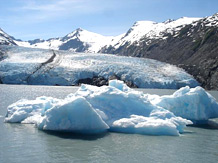Summary
Solar energy is a fundamental driver of climate systems. By studying how much and what kind of visible light and ultra-violet radiation reaches the earth over long periods of time, scientists can better understand atmospheric conditions and predict climate change.
This is especially true at high latitudes. Years ago, Frederick was involved in measuring ultraviolet radiation in the high-latitude Southern Hemisphere at a time when the ozone layer was a concern. Lately, his work focuses on the Northern Hemisphere. Methods developed for detecting changes in the radiation environment of Antarctica will carry over to the current Arctic analyses.
The new grant will allow Frederick to continue gathering data at sites in Barrow, Alaska, and Summit, Greenland, as part of broader multi-year studies, including the international SEARCH, or Study of Environmental Arctic Change.
"One of the things we will be looking for are factors that drive changes in ultra-violet radiation, including systematic changes in cloudiness or cloud properties," Frederick said. "If such changes are occurring, we should know about them and incorporate the data into our climate change models. If not, this is important to document as well."
Undergraduate students at the University of Chicago will be involved in data processing, quality assessment and quality control of the gathered data. The NSF funding will also support research experiences for public seminars on issues related to climate.
On a broader level, this work will provide data to researchers in various disciplines, including satellite ground-truthing, in which information collected "on the ground" is compared with and used to interpret, verify and analyze information that is collected remotely via satellite.
"In collaboration with the Graham School of General Studies, we will provide summer courses for teachers in Chicago Public Schools where enrollments consist predominantly of minority students," Frederick said. "Courses will cover atmospheric and environmental research in both Polar Regions, and course materials will be drawn partly from results of our research projects."
by Greg Borzo
This award is funded under the American Recovery and Reinvestment Act of 2009, NSF Award number: 0856268. For more information on NSF Recovery Act projects, visit http://www.nsf.gov/recovery/.

 Ultrathin but super strong
Ultrathin but super strong
 Addressing Health Disparities
Addressing Health Disparities
 A new way to fight transplant rejection
A new way to fight transplant rejection
 Building a better mouse model
Building a better mouse model
 Testing tools that detect head/neck cancer
Testing tools that detect head/neck cancer
 New equipment opens up the world
New equipment opens up the world
 Tracking climate change by studying solar radiation
Tracking climate change by studying solar radiation

